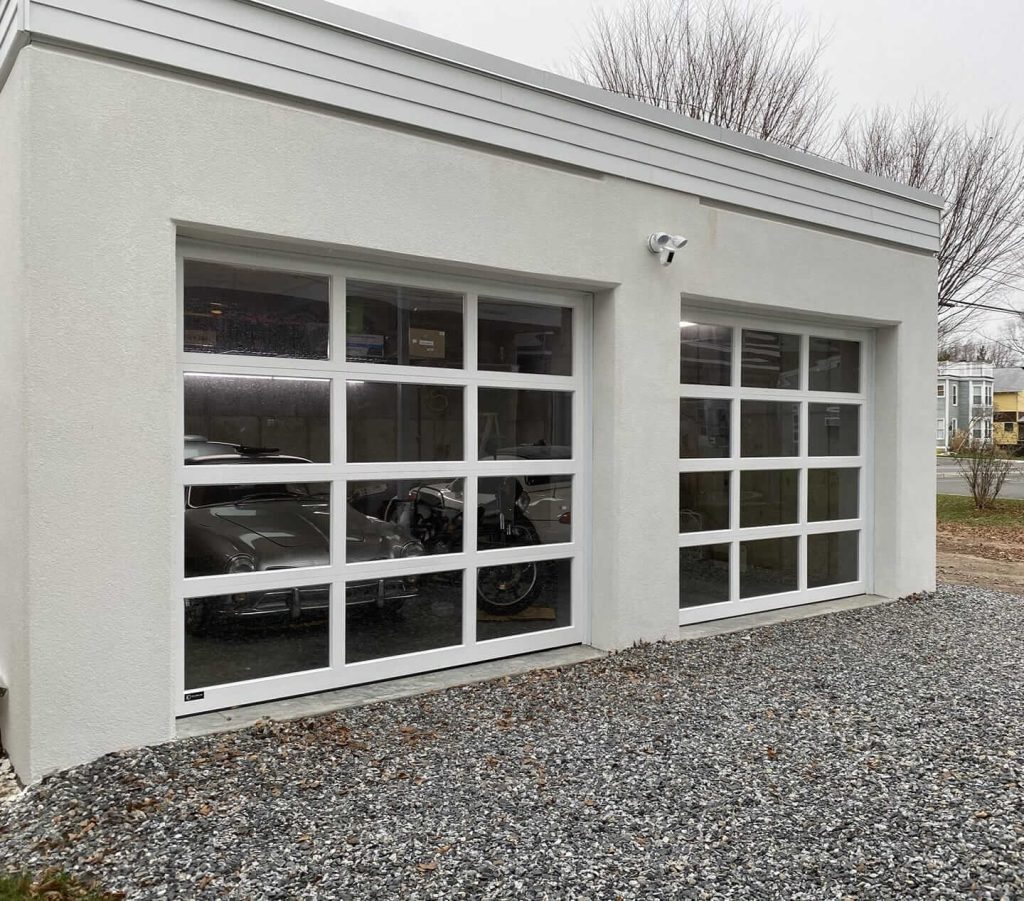Like a sturdy shield protecting your home, the thickness of the glass plays a vital role in its durability. But how thick is it exactly? Is there a standard thickness for garage door glass, or does it vary? In this discussion, we will explore the topic of garage door glass thickness, unveiling the factors that affect it and the different options available. By the end, you will gain a deeper understanding of this crucial aspect and be better equipped to choose the right thickness for your garage door glass. So, let’s uncover the mysteries and find out just how thick garage door glass really is.
Standard Thickness of Garage Door Glass
The standard thickness of garage door glass varies depending on whether it is single pane or insulated glass. For single pane glass, the thickness typically ranges from 1/8 to 5/8, depending on the type of glass chosen. Thicker glass is generally more durable and can withstand harsh conditions better. Insulated glass, on the other hand, has a standard thickness of 1/2 inch.
When considering the thickness of garage door glass, it is important to take into account safety considerations. Opting for impact-resistant glass can provide added protection against breakage and potential intruders. Additionally, energy-efficient options, such as insulated glass, can help regulate temperature and reduce energy consumption.
Privacy-enhancing glass is another customization choice to consider. Tinted, frosted, acid-etched, or mirror glass can provide privacy while still allowing natural light into the garage.
Factors Affecting Garage Door Glass Thickness
To determine the appropriate thickness for garage door glass, several factors need to be considered. These factors include the impact of glass thickness on safety, the cost implications of different glass thicknesses, the benefits of insulated glass for energy efficiency, considerations for single pane glass thickness, and the durability advantages of thicker garage door glass.
- Impact of glass thickness on safety: Thicker glass provides better protection against impacts and potential breakage, enhancing the safety of the garage door.
- Cost implications of different glass thicknesses: Thicker glass tends to be more expensive than thinner glass due to the additional materials required.
- Benefits of insulated glass for energy efficiency: Insulated glass helps to regulate the temperature inside the garage, reducing energy consumption and increasing energy efficiency.
- Considerations for single pane glass thickness: Single pane glass thickness can range from 1/8 to 5/8 inch, depending on the specific needs and requirements of the garage door.
- Durability advantages of thicker garage door glass: Thicker glass is generally more durable and can withstand harsh conditions better, making it a preferred choice for areas with extreme weather conditions.
Insulated Glass Thickness for Garage Doors
Insulated glass for garage doors comes in various thicknesses to provide optimal energy efficiency and durability. When choosing the right thickness for your garage door, there are several factors to consider, including the benefits of insulated glass, energy efficiency considerations, impact-resistant glass options, tinted glass for privacy, and the cost comparison of different glass thicknesses.
Insulated glass offers several advantages for garage doors. It helps to regulate temperature, keeping your garage cooler in the summer and warmer in the winter. This can lead to energy savings and a more comfortable environment. Additionally, insulated glass can reduce noise transmission, providing a quieter space.
When it comes to energy efficiency, the thickness of the glass plays a crucial role. Thicker glass can provide better insulation, resulting in greater energy savings. However, it is essential to strike a balance between energy efficiency and cost. Thicker glass tends to be more expensive, so it’s important to consider your budget when making a decision.
Another consideration is impact resistance. Thicker glass is generally more impact resistant, providing added protection against accidental breakage or damage.
If privacy is a concern, tinted glass options are available. Tinted glass can provide privacy while still allowing natural light to enter your garage.
To give you a better understanding of the cost comparison of different glass thicknesses, here is a table showcasing the approximate costs for various glass thicknesses:
| Glass Thickness | Cost per Square Foot |
|---|---|
| 1/8 inch | $X |
| 1/4 inch | $Y |
| 1/2 inch | $Z |
Keep in mind that these costs are approximate and may vary depending on the manufacturer and other factors. It’s always best to consult with a professional to determine the most suitable glass thickness for your garage door, considering your specific needs and budget.
Single Pane Glass Thickness for Garage Doors
When considering the thickness of single pane glass for garage doors, it is important to understand the different options available to find the most suitable choice for your needs. Here are some key points to consider:
- Heat strengthened vs tempered glass: Tempered glass is the preferred option for garage doors due to its safety benefits. It is harder to break and shatters into small pebbles when it does break. Heat strengthened glass is another option but not as widely used for garage doors.
- Privacy options for garage door glass: Depending on your preference, you can choose from various privacy options such as frosted, tinted, or switchable glass. These options provide varying degrees of privacy while still allowing natural light to enter.
- Pros and cons of laminated glass: Laminated glass consists of multiple layers held together by adhesive resin, providing insulation and durability. It offers enhanced security and noise reduction but may come at a higher cost compared to other glass types.
- Cost comparison of different glass types: The cost of garage door glass can vary depending on the type and thickness of the glass. Generally, thicker glass tends to be more expensive. Tempered glass is a popular choice due to its affordability and safety features.
- Impact of glass thickness on energy efficiency: Thicker glass tends to have better insulation properties, which can contribute to improved energy efficiency in your garage. However, it is important to strike a balance between thickness and cost to ensure the best value for your investment.
Thicker Glass for Enhanced Durability
Thicker glass is an essential consideration for enhancing the durability of your garage door. When comparing tempered glass to annealed glass, tempered glass is the superior choice in terms of safety benefits and durability advantages. Tempered glass is harder to break and, if it does break, it shatters into small pebbles, reducing the risk of injury. Although upgrading to tempered glass may come at a higher cost, it is worth it for the added safety it provides.
In addition to its safety benefits, thicker glass also offers increased durability. Thicker glass can withstand harsh conditions better and is less likely to crack or break. This means that your garage door will be able to withstand the daily wear and tear, ensuring its longevity and reducing the need for frequent repairs or replacements.
Furthermore, thicker glass can also have an impact on the energy efficiency of your garage door. Insulated glass with a thicker thickness can provide better insulation, helping to regulate temperature and reduce energy loss. This can result in lower energy bills and a more comfortable environment inside your garage.
Range of Garage Door Glass Thickness
You have several options when it comes to the thickness of garage door glass. The range of garage door glass thickness can vary based on various factors such as safety considerations, cost implications, impact on energy efficiency, availability of different glass types, and the importance of professional installation. Here are some key points to consider:
- Safety considerations: Thicker glass generally provides better durability and resistance to breakage, enhancing the safety of your garage door.
- Cost implications: Thicker glass may come at a higher cost compared to thinner options, so it’s important to consider your budget when choosing the thickness.
- Impact on energy efficiency: Insulated glass with a thicker thickness can provide better insulation and energy efficiency, helping to regulate the temperature inside your garage.
- Availability of different glass types: Different glass types come in varying thickness options, allowing you to choose based on your preferences and needs.
- Importance of professional installation: It is crucial to have your garage door glass professionally installed to ensure proper fit, functionality, and safety.
Choosing the Right Thickness for Your Garage Door Glass
To ensure the proper functionality and safety of your garage door, it is important to carefully choose the thickness of your garage door glass. Safety considerations for garage door glass should be a top priority when making this decision. Thicker glass tends to be more durable and can withstand harsh conditions better. However, it is important to balance safety with cost. Comparing the cost of different glass types for garage doors is crucial in finding the right balance. Tempered glass is a popular choice due to its safety value, but laminated glass also offers benefits such as insulation and durability. Consider the pros and cons of using laminated glass in garage doors before making a decision. Additionally, the impact of glass thickness on energy efficiency should be taken into account. Thicker glass can provide better insulation and potentially reduce energy costs. Lastly, choosing the right glass thickness based on location and climate is essential. Harsher climates may require thicker glass for added protection. By considering these factors, you can make an informed decision and choose the right thickness for your garage door glass.






